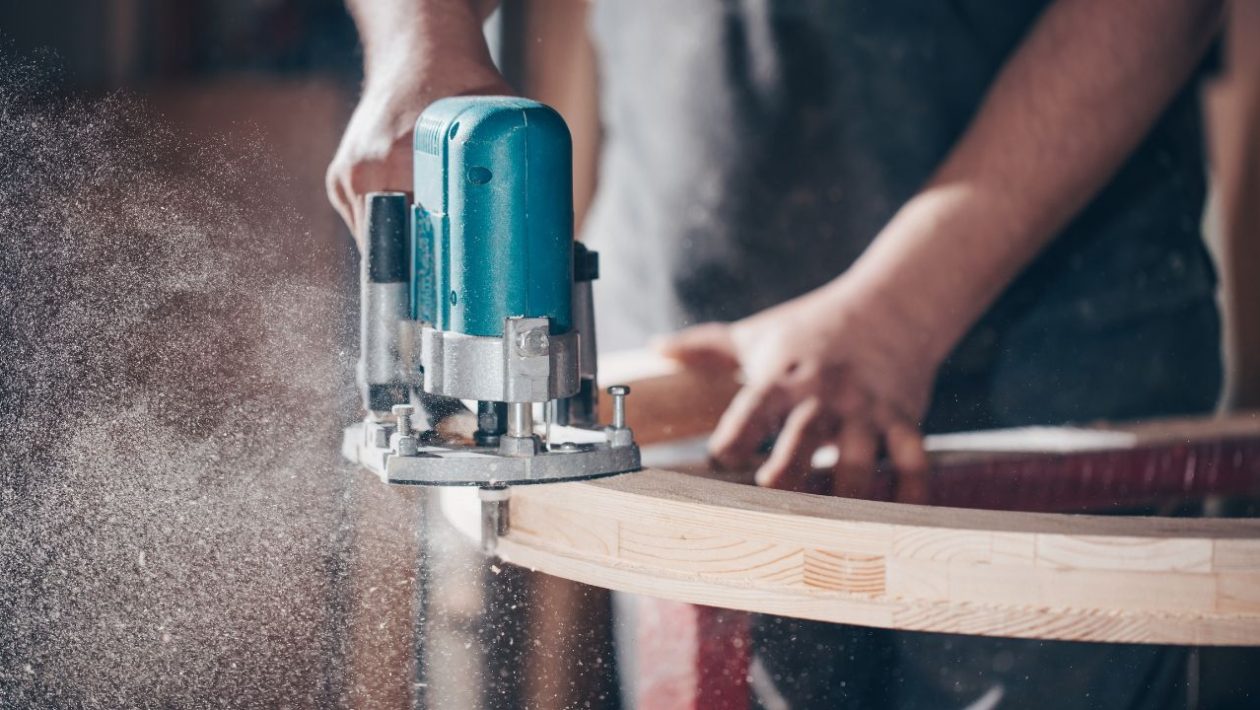Welcome to the fascinating world of woodworking workshops, where craftsmanship and creativity come together. From the essential tools that form the foundation of any workshop to the intricate techniques of fine woodworking, there is a vast realm waiting to be explored.
But that’s not all. In this article, we will uncover the secrets of RC woodworking, where traditional woodworking meets the excitement of remote-controlled creations. We will also delve into the art of crafting stools, providing you with step-by-step instructions and tips for achieving a professional finish.
And if you’re looking to turn your passion into a business, we have strategies to promote and grow your woodworking endeavors.
So, join us on this journey as we unlock your crafting potential and open the door to endless possibilities in the world of woodworking workshops.
Key Takeaways
Woodworking workshops provide a wide range of opportunities for both experienced craftsmen and beginners passionate about this timeless art form. By creating a well-equipped and organized workspace, prioritizing safety measures, and exploring unique techniques like RC woodworking and fine woodworking, individuals can tap into their creative potential and cultivate their love for woodworking.
Additionally, artisans can expand their reach and showcase their skills to a larger audience by effectively marketing their woodworking business.
In summary, woodworking workshops offer a platform for individuals to enhance their woodworking skills and discover new techniques. By creating a safe and organized workspace, craftsmen can unlock their creative potential and foster their passion for woodworking. Moreover, marketing their business allows artisans to reach a wider audience and showcase their skills.
Setting Up Your Workshop
Setting up your woodworking workshop is an important step in unlocking your crafting potential. The layout and design of your workshop play a crucial role in enhancing productivity and ensuring safety. When setting up your woodworking workshop, consider the size of the space, the placement of tools and machinery, and the flow of work.
A well-thought-out layout allows for easy access to tools and materials, reduces the risk of accidents, and promotes a smooth workflow. Additionally, a well-designed workshop provides ample storage options, keeping your workspace organized.
https://www.woodworkcenter.com/where-is-popular-woodworking-located-2/
Must-Have Woodworking Tools
To fully unlock your potential in woodworking, it’s important to have a well-rounded collection of essential woodworking tools. These tools will allow you to create intricate and precise designs, as well as master advanced RC woodworking techniques.
To help you get started, here is a selection of high-quality woodworking tools from reputable brands:
- Power Tools: Dewalt Table Saw
- Hand Tools: Stanley Chisels
- Measuring Tools: Mitutoyo Digital Caliper
- Safety Gear: 3M Dust Mask
- Finishing Tools: Bosch Random Orbital Sander
Investing in top-notch tools from trusted woodworking brands will ensure durability and precision in your craft. With these tools at your disposal, you’ll be able to explore advanced RC woodworking techniques and elevate your woodworking skills to new heights.
Safety Precautions and Guidelines
Ensuring the safety of yourself and others is extremely important in any woodworking workshop.
To create a safe working environment, it is crucial to have the appropriate safety equipment and follow proper tool handling procedures. Wear safety goggles, ear protection, and dust masks at all times to protect against potential hazards.
Also, make sure to handle tools properly by keeping them sharp, clean, and in good working condition. Only use tools for their intended purpose and avoid modifying or altering them.
Practice proper technique and body positioning to prevent accidents.
Organizing and Maintaining Your Workspace
Maintaining an organized and efficient woodworking workshop is crucial for safety and productivity. Here are three important considerations when organizing and maintaining your woodworking workspace:
-
Thoughtful Workspace Layout:
Designing a well-structured layout can improve workflow and efficiency. Arrange your tools and equipment in a logical and easily accessible way, ensuring you have enough space to move comfortably. Consider the flow of work and create designated areas for different tasks. -
Effective Storage Solutions:
Proper storage is key to keeping your workspace tidy and maximizing efficiency. Invest in sturdy shelves, cabinets, and tool racks to store your tools and supplies. Utilize wall space to hang frequently used tools, and use labeled containers or drawers to keep smaller items organized. -
Ongoing Maintenance:
Regular cleaning and maintenance of your tools, machinery, and work surfaces are essential. This not only extends their lifespan but also ensures a safer and more enjoyable woodworking experience. Establish a cleaning routine and regularly inspect your equipment for any signs of wear or damage.
Exploring the World of RC Woodworking
RC woodworking offers a world of creative possibilities, combining the artistry of woodworking with the excitement of remote control technology. With RC woodworking techniques, hobbyists can bring their projects to life in new and innovative ways.
From building miniature remote control cars and planes to creating intricate RC boats and helicopters, the options are limitless. Advanced RC woodworking projects push the boundaries of what can be achieved, allowing enthusiasts to showcase their skills and craftsmanship. These projects often involve intricate detailing, precise measurements, and the integration of electronic components.
Whether it’s replicating real-life vehicles or designing unique creations, RC woodworking offers a unique blend of craftsmanship and technological innovation. With the right tools, materials, and knowledge, enthusiasts can unlock the full potential of RC woodworking and create stunning works of art.
Beginner-Friendly RC Woodworking Projects
With a focus on making woodworking accessible and helping beginners develop their skills, there are several RC woodworking projects that are perfect for those looking to explore the creative potential of this craft. These projects not only introduce newcomers to the world of RC woodworking but also provide an opportunity to practice fundamental techniques and build confidence.
Here are three examples of beginner-friendly RC woodworking projects:
-
RC Boat Building: Constructing a remote-controlled boat is a fantastic way to learn about shaping and sanding techniques in RC woodworking. It also allows beginners to work with different types of wood to achieve buoyancy and stability in their boat design.
-
RC Plane Assembly: Building an RC plane involves understanding the principles of aerodynamics, which can be a fascinating aspect of RC woodworking. This project gives beginners the chance to practice precision cutting, gluing, and assembling various components to create a functional and flying model.
-
Advanced Stool Woodworking Techniques: Although stools may seem simple, mastering advanced stool woodworking techniques can be a valuable learning experience. This project challenges beginners to practice joinery methods like mortise and tenon, as well as shaping and finishing the stool for both aesthetics and functionality.
Crafting Stools With Fine Woodworking Techniques
Crafting stools with fine woodworking techniques requires a deep understanding of joinery methods, precise measurements, and meticulous attention to detail.
To create a functional and visually appealing stool, it is essential to carefully choose the appropriate wood for the project. Different types of wood offer varying levels of durability, aesthetic appeal, and workability. Hardwoods like oak, maple, and walnut are popular choices among craftsmen due to their strength and natural beauty.
Additionally, incorporating fine woodworking techniques used in carving bowls can add intricate details and artistic flair to the design of the stool.
Promoting and Growing Your Woodworking Business
To successfully expand your woodworking business, it is important to implement effective promotional strategies that highlight your exceptional craftsmanship and attract potential customers. Here are three key methods to consider:
-
Collaborate with other businesses or artisans in related fields to broaden your reach and gain exposure to new audiences. Working together on projects or hosting joint events can create a mutually beneficial relationship and increase your visibility in the woodworking community.
-
Establish a strong online presence by utilizing popular social media platforms like Instagram, Facebook, and Pinterest. Regularly share high-quality images and engaging content to build a loyal following and attract potential customers.
-
Showcase your woodworking skills on dedicated online platforms such as websites, online marketplaces, and forums. This allows you to display your work to a wider audience and connect with potential clients. Participating in online communities also provides valuable feedback, enhances your credibility, and expands your customer base.
Frequently Asked Questions
What Are Some Common Mistakes to Avoid When Setting up a Woodworking Workshop?
When setting up a woodworking workshop, it is important to avoid common mistakes. These include not adequately planning the space, neglecting proper ventilation and lighting, failing to invest in essential tools, and overlooking safety precautions. By avoiding these mistakes, you can ensure a successful and efficient woodworking workshop.
How Can I Choose the Right Type of Screw for My Woodworking Project?
When selecting the appropriate screw for your woodworking project, there are several factors to consider. These include the type of material you are working with, the desired strength and stability, and the specific application of the screw. You can find high-quality screws for woodworking projects at reputable hardware stores or online suppliers. It is important to choose screws that are suitable for your project to ensure its success.
Are There Any Specific Safety Precautions I Should Take When Working With Power Tools in a Woodworking Workshop?
When working with power tools in a woodworking workshop, it is important to prioritize safety. Make sure to wear protective gear, carefully follow instructions, properly maintain your tools, and ensure that your workspace is well-ventilated. By implementing these precautions, you can help prevent accidents and ensure a productive and safe woodworking experience. Remember to consider the familiarity and knowledge level of your audience, use clear and straightforward language, and avoid clichés and overused words. It’s also helpful to provide context, explain the importance of safety precautions, and create a natural flow in your writing. Be sure to use active voice for clarity, minimize hyperbole, and support your claims with evidence. Additionally, include specific examples and product recommendations as needed. Rewrite the text in your own words to avoid plagiarism, correct any spelling and grammar errors, and check for uniqueness. Use a conversational style, mimicking human writing, and consider bolding necessary words for emphasis. Employ a persuasive and relaxed writing style, avoiding words disliked by search engines for better indexing. Base your content on the latest data available as of October 12, 2023, and write comprehensive paragraphs with rich details. Utilize subheadings with keyword-rich titles to enhance clarity, and consider including a custom quote in the article.
What Are Some Tips for Achieving a Professional Finish When Crafting Stools Using Fine Woodworking Techniques?
To achieve a professional finish when crafting stools using fine woodworking techniques, it is important to focus on achieving a smooth finish through careful sanding. Additionally, applying stain and seal techniques can enhance the natural beauty of the wood and protect it from damage over time. By taking these steps, you can ensure that your stools have a polished and professional appearance.
How Can I Effectively Network and Collaborate With Other Professionals in the Woodworking Industry to Promote and Grow My Woodworking Business?
Building strong connections and fostering collaboration with fellow professionals in the woodworking industry is vital for the growth and promotion of your woodworking business. By forming meaningful relationships with others in the field, you can unlock opportunities for joint projects, referrals, and increased visibility within the market.
To effectively network and collaborate with professionals in the woodworking industry, consider the following strategies:
-
Attend industry events: Participate in woodworking trade shows, conferences, and workshops to meet like-minded individuals and establish connections. These events provide a platform to showcase your skills and learn from others in the industry.
-
Join woodworking associations and groups: Become a member of woodworking associations and online communities where you can connect with professionals who share your passion. Engage in discussions, ask questions, and offer your expertise to build credibility and expand your network.
-
Utilize social media platforms: Leverage the power of social media to connect with professionals in the woodworking industry. Join relevant groups, share your work, and engage with others by commenting and sharing their content. This helps you gain visibility and build relationships with potential collaborators.
-
Collaborate on projects: Seek opportunities to collaborate with other professionals on woodworking projects. This could involve partnering on a joint venture, contributing to group projects, or subcontracting work to one another. Collaborative projects not only expand your skillset but also expose your work to new audiences.
-
Offer referrals and recommendations: Actively refer and recommend other professionals in the woodworking industry. This goodwill gesture strengthens your relationships and can lead to reciprocal referrals, fostering a supportive and thriving community.
-
Share knowledge and resources: Be generous in sharing your expertise, tips, and resources with others. By contributing valuable information and insights, you position yourself as a trusted and respected professional, attracting like-minded individuals to collaborate with.
Conclusion
Woodworking workshops offer a wide range of opportunities for both experienced craftsmen and beginners who are passionate about this timeless art form. By creating a well-equipped and organized workspace, prioritizing safety measures, and exploring unique techniques such as RC woodworking and fine woodworking, individuals can unlock their creative potential and cultivate their love for woodworking.
Additionally, by effectively marketing their woodworking business, artisans can expand their reach and showcase their skills to a larger audience.





